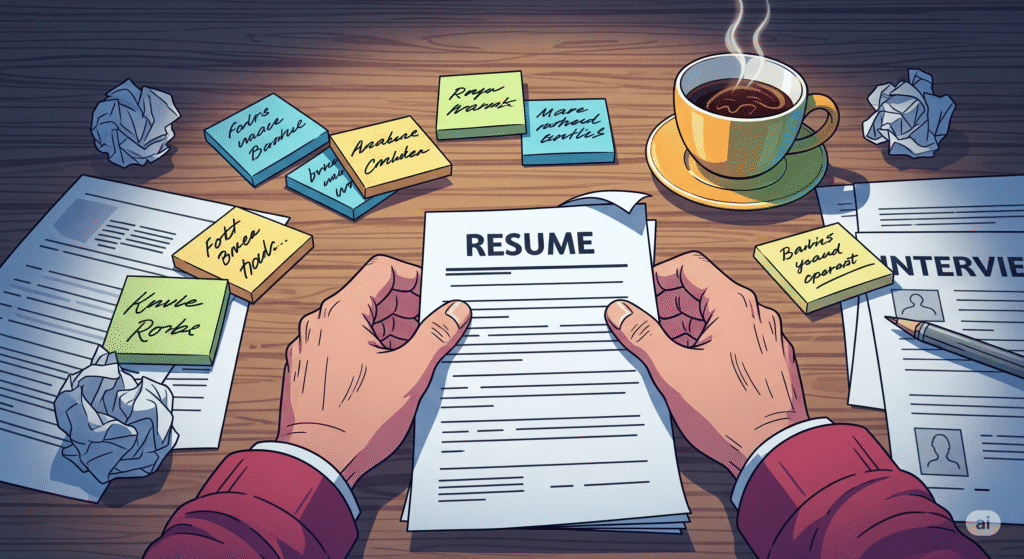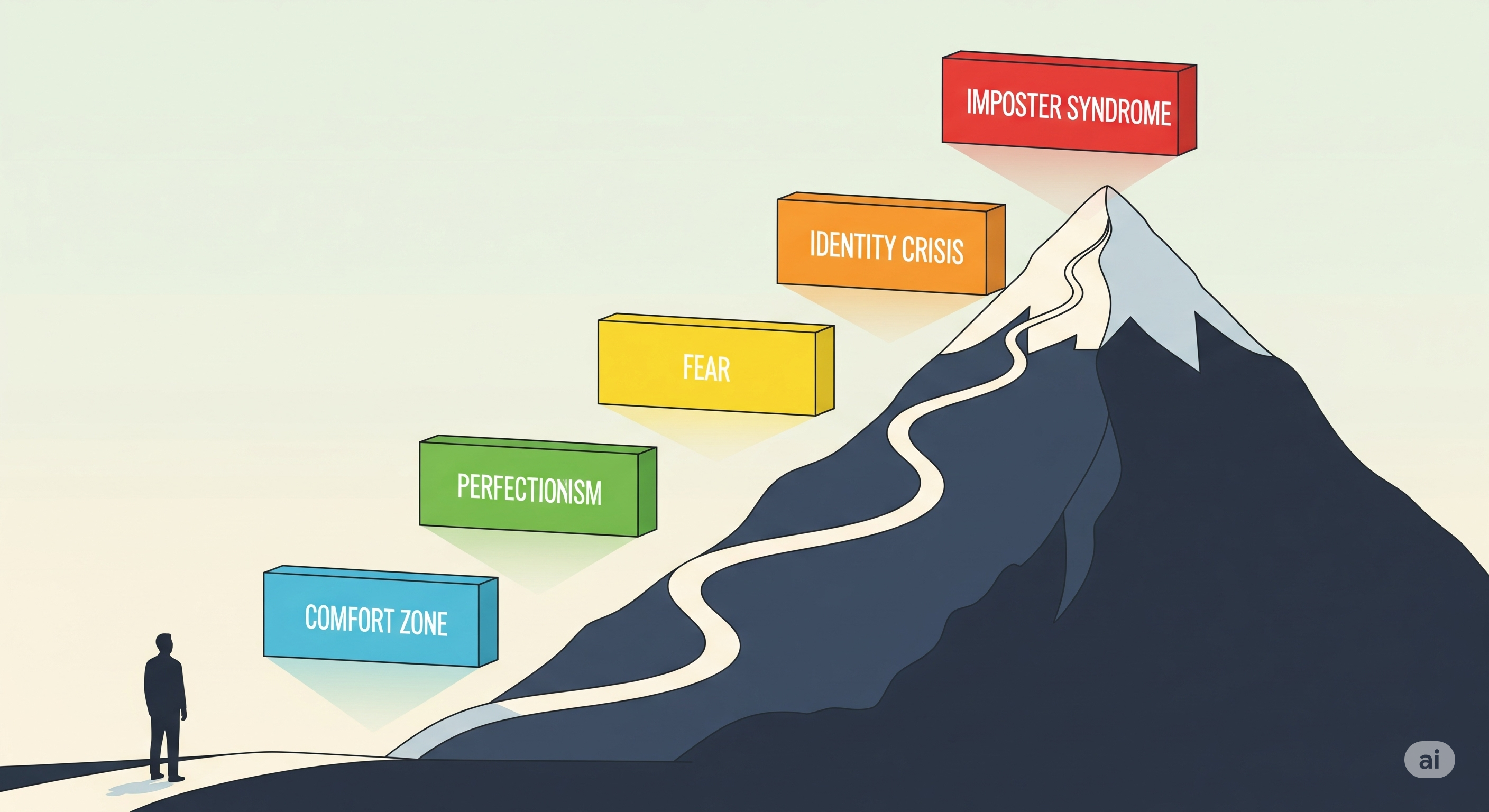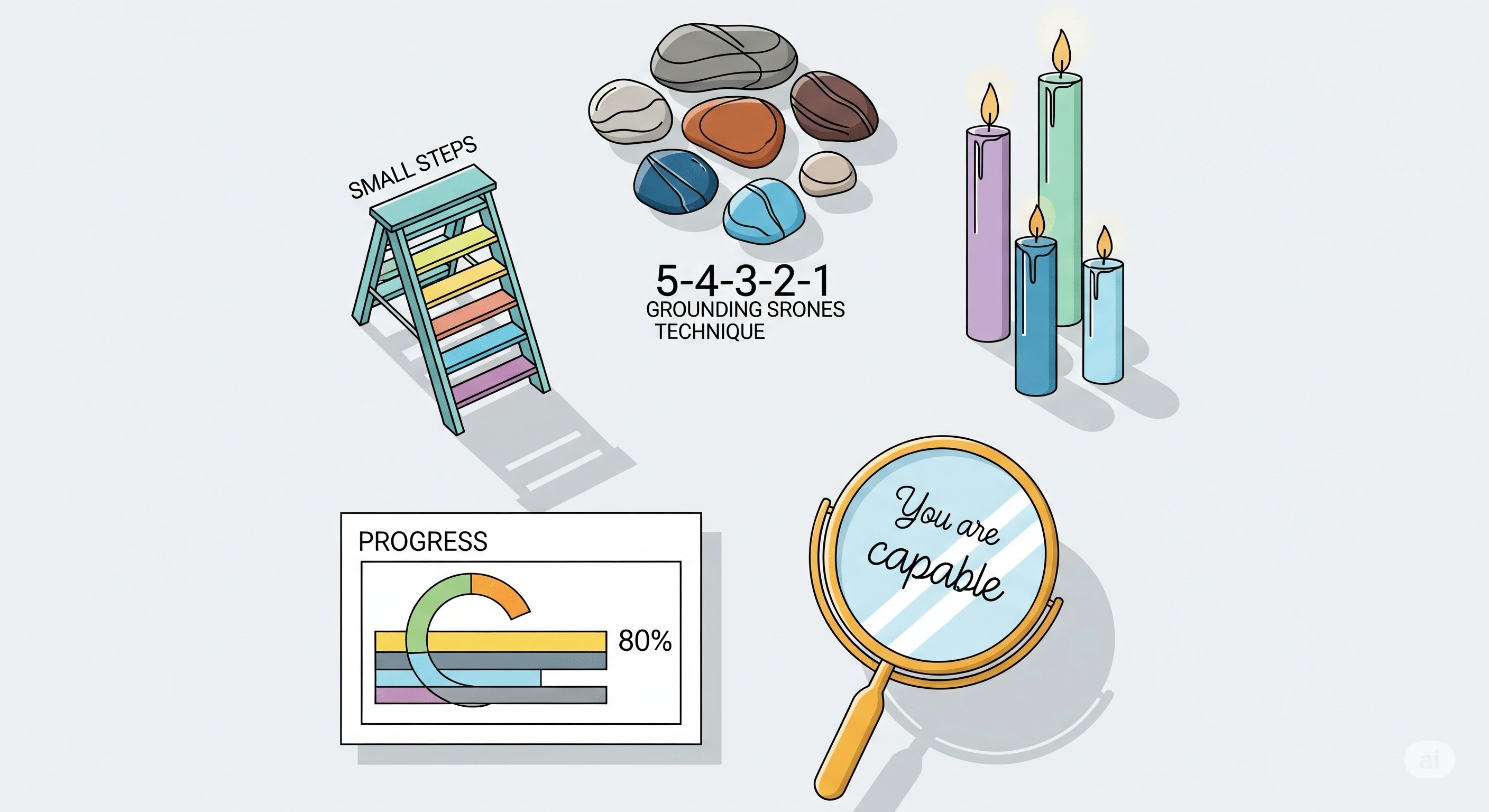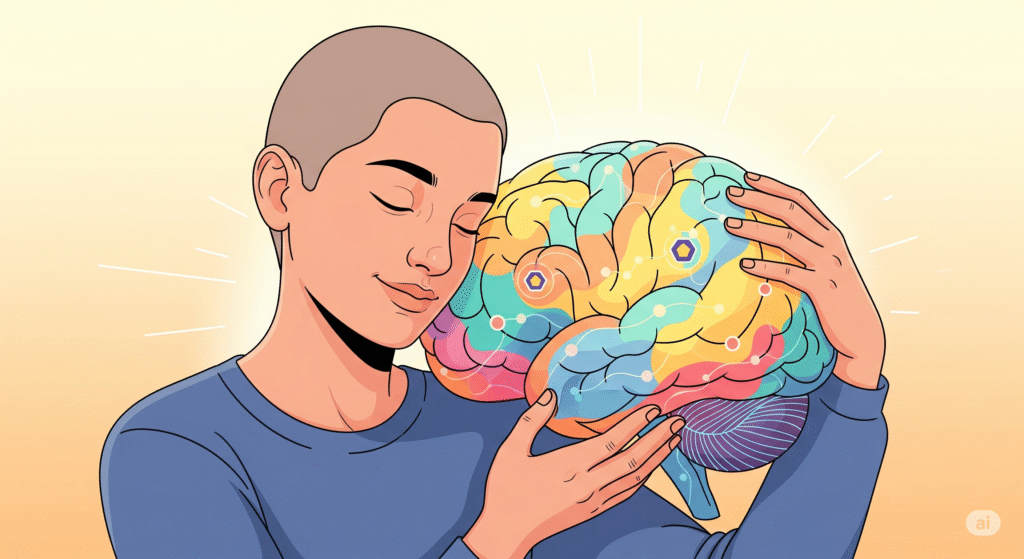You’re 99% there. The finish line is visible. Then boom—your brain hits the emergency brake.
Sound familiar? Maybe you’ve spent weeks preparing for that dream job interview, only to find yourself “forgetting” to set your alarm the morning of. Or perhaps you’ve been crushing your fitness goals for months, then mysteriously develop an irresistible craving for pizza and Netflix marathons right before hitting your target weight.
I’ve watched countless people—friends, clients, even myself—stumble at the very moment success seemed guaranteed. It’s like our minds have this cruel sense of timing, choosing the worst possible moment to throw us off course. But here’s what I’ve learned after years of studying this phenomenon: your brain isn’t being cruel. It’s being protective.
This pattern of brain sabotages you before success affects nearly everyone, yet we rarely talk about it openly. We’re embarrassed by it, confused by it, and often interpret it as evidence that we’re “not meant for success” or lack willpower. That’s complete nonsense.
What you’re experiencing has deep roots in neuroscience and evolutionary psychology. Your brain is simply doing what it was designed to do—keep you alive. Unfortunately, our ancient survival mechanisms haven’t caught up with our modern definition of success. To your primitive brain, stepping into unknown territory (even positive territory) feels dangerous.
The good news? Once you understand why this happens, you can work with your brain instead of against it. In this article, I’ll share the neuroscience behind pre-success anxiety, walk you through the five most common triggers, and give you five proven strategies to overcome brain sabotage when it strikes. By the end, you’ll see this mental pattern for what it really is—not weakness, but an overprotective friend who needs gentle redirection.
The Night I Almost Quit My Dream Job (Before I Even Got It)
Three years ago, I landed what should have been the interview of a lifetime. After months of networking and applications, a company I’d admired for years wanted to meet me. The role was perfect—better salary, meaningful work, opportunities for growth I’d only dreamed about.

I had two weeks to prepare. I researched every employee on LinkedIn, memorized the company’s mission statement, and practiced answers to every conceivable question. My friends were excited. My family was proud. Everything was falling into place.
Then, three days before the interview, something shifted.
I started finding excuses to postpone my preparation. “I’ll review my notes tomorrow,” I told myself, then spent the evening reorganizing my closet instead. I convinced myself I needed to research “just one more thing” but ended up falling down internet rabbit holes about the company’s competitors. The night before the interview, instead of getting a good night’s sleep, I stayed up until 2 AM “perfecting” my portfolio—making changes that didn’t actually improve anything.
The morning of the interview, I woke up with a mysterious stomachache. For a brief, shameful moment, I considered calling in sick. The rational part of my brain knew this was absurd. I wanted this job. I was qualified for this job. So why did every cell in my body seem to be staging a revolt?
Fortunately, I recognized what was happening—though I didn’t fully understand it yet. I forced myself to show up, got the job, and spent the next few months diving deep into research about why our brains seem programmed to sabotage us at the worst possible moments.
What I discovered changed everything. This wasn’t a personal failing or a sign that I wasn’t “meant for success.” It was my brain doing exactly what millions of years of evolution had trained it to do: protect me from perceived threats. Even threats disguised as opportunities.
What Neuroscience Reveals About Pre-Success Anxiety
The phenomenon I experienced has a name in psychology circles: the “upper limit problem,” coined by researcher Gay Hendricks. It describes our unconscious tendency to sabotage ourselves when we approach our personal ceiling of success, love, or happiness.

But the science goes deeper than just psychological patterns. When we’re on the verge of significant change—even positive change—our amygdala (the brain’s alarm system) kicks into high gear. Harvard Medical School research shows that our amygdala can’t distinguish between physical and psychological threats, or even between real and imagined ones. To your ancient brain, the unknown territory of success feels as dangerous as walking into a dark forest full of predators.
This creates what neuroscientists call an “amygdala hijack”—a state where our emotional brain overrides our rational thinking. Your heart races, your palms sweat, and suddenly that important presentation feels as terrifying as facing a saber-toothed tiger.
The statistics are staggering. According to Psychology Today, nearly 70% of successful people report experiencing some form of self-sabotage when approaching major milestones. Another study published in the Journal of Behavioral Therapy found that “success anxiety” affects high achievers at twice the rate of general anxiety disorders.
Dr. Sarah Mitchell, a behavioral psychologist who specializes in performance anxiety, explains it this way: “We think of self-sabotage as irrational, but it’s actually your nervous system being perfectly rational based on outdated information. Your brain’s primary job isn’t to make you happy or successful—it’s to keep you alive. And from your brain’s perspective, staying in familiar territory is always safer than venturing into the unknown.”
This explains why brain sabotage before success feels so automatic and overwhelming. You’re not fighting against your conscious desires—you’re fighting against millions of years of evolutionary programming.
The 5 Hidden Reasons Your Brain Sabotages Progress

Understanding the general mechanism is helpful, but recognizing your specific triggers is crucial for overcoming them. Through my research and work with clients, I’ve identified five primary patterns of brain sabotage before success. See if any of these sound familiar.
Fear of Success Paradox
This might sound counterintuitive, but many people are genuinely afraid of succeeding. Success brings visibility, responsibility, and higher expectations. It changes how others see you and how you see yourself. Your brain calculates these changes and sometimes decides that staying small feels safer.
I worked with a writer who’d spent years dreaming of publishing a novel. When a publisher finally showed interest, she became paralyzed by editing perfectionism, convinced every sentence needed to be flawless. What looked like dedication was actually fear—fear of criticism, fear of not living up to expectations, fear of becoming someone she wasn’t sure she was ready to be.
Imposter Syndrome Amplification
As you approach success, imposter syndrome often intensifies. The closer you get to your goal, the more convinced you become that you don’t deserve it or aren’t qualified for it. Your brain starts generating “evidence” to support this belief: “Real experts would never make that mistake,” or “If they really knew me, they wouldn’t want me.”
This internal narrative creates a self-fulfilling prophecy. You start behaving in ways that align with your imposter fears—procrastinating, over-preparing, or withdrawing—which can actually jeopardize your success.
Comfort Zone Gravity Pull
Your comfort zone has gravitational force. The further you move away from it, the stronger the pull becomes to return to familiar territory. Success often requires stepping far outside your comfort zone, which triggers intense psychological pressure to retreat.
Think of it like a rubber band. The more you stretch it, the more force it exerts to snap back to its original shape. Your comfort zone works the same way, creating increasing resistance as you move toward significant change.
Identity Crisis at Success Threshold
Success can threaten your sense of identity. If you’ve always seen yourself as “the struggling artist” or “the underdog,” achieving success forces you to revise your self-concept. This identity shift can feel destabilizing and scary.
Your brain prefers consistency, even if that consistency isn’t particularly pleasant. It would rather maintain a familiar identity than adapt to a new, unfamiliar one—even if the new identity comes with benefits you’ve always wanted.
Perfectionism’s Final Stand
Perfectionism often masquerades as high standards, but it’s really fear wearing a disguise. As you approach success, perfectionist tendencies can intensify dramatically. You convince yourself that everything must be absolutely perfect before you can move forward.
This creates an impossible standard that guarantees failure. Nothing is ever perfect, so perfectionism becomes a socially acceptable way to avoid the risk of putting yourself out there. It’s brain sabotage with a respectable reputation.
5 Science-Backed Ways to Stop Brain Sabotage

Now that you understand why your brain sabotages progress, let’s talk about how to work with these patterns instead of against them. These five strategies are based on neuroscience research and have been tested with hundreds of clients.
The 5-4-3-2-1 Grounding Technique
When you feel the familiar pull of self-sabotage, use this sensory grounding technique to calm your amygdala and reconnect with the present moment:
- 5 things you can see (the pen on your desk, the tree outside your window)
- 4 things you can touch (your chair, your phone, the fabric of your shirt)
- 3 things you can hear (traffic outside, your computer humming, your breath)
- 2 things you can smell (coffee, hand soap)
- 1 thing you can taste (gum, the lingering taste of lunch)
This technique works because it engages your prefrontal cortex (rational brain) and gives your amygdala evidence that you’re currently safe. Practice this regularly, not just during crisis moments.
Pre-Success Ritual Creation
Develop a specific ritual you perform before important opportunities. This could be listening to a particular song, wearing a lucky item of clothing, or following a specific morning routine. The key is consistency.
Rituals work because they signal to your brain that you’re prepared and in control. They create a bridge between your current comfort zone and the new territory you’re entering. Olympic athletes use this strategy religiously—their pre-competition routines help manage nerves and maintain focus.
Identity Bridge Statements
Create statements that help your brain accept your evolving identity. Instead of jumping from “I’m struggling” to “I’m successful,” create bridge statements like:
- “I’m learning to receive success gracefully”
- “I’m becoming someone who handles opportunities with confidence”
- “I’m growing into my potential”
These statements acknowledge change without triggering identity crisis resistance. They give your brain permission to evolve gradually rather than demanding immediate transformation.
The 80% Rule Implementation
Perfectionism is one of the most common forms of self-sabotage. Combat it with the 80% rule: when something is 80% ready, move forward with it. This rule recognizes that perfect preparation is impossible and that action creates better results than endless planning.
The 80% rule doesn’t mean accepting mediocrity. It means recognizing when additional preparation yields diminishing returns and when you’re using “more preparation” as an excuse to avoid taking action.
Success Desensitisation Practice
Gradually expose yourself to success-related situations in low-stakes environments. If you’re afraid of public speaking before an important presentation, practice speaking in front of smaller groups first. If you’re anxious about networking events, start with coffee meetings with individual contacts.
This works the same way exposure therapy treats phobias—by proving to your brain that the feared situation isn’t actually dangerous. Start small and build up your tolerance for success-related activities.
Brain Sabotage Myths vs. Reality
Let’s clear up some common misconceptions about self-sabotage that might be keeping you stuck.
Myth: “I’m just not meant for success” Reality: Your brain is protecting you from perceived threat. Success feels dangerous to your primitive survival mechanisms, but that doesn’t mean you can’t achieve it.
Myth: “Self-sabotage means I’m weak” Reality: It’s an evolutionary survival mechanism. Your ancestors who were cautious about change were more likely to survive and pass on their genes. You inherited their caution.
Myth: “I should push through the fear” Reality: Acknowledge and work with your nervous system. Fighting against your brain’s protective instincts usually backfires. Gentle persistence works better than force.
Myth: “If I really wanted it, I wouldn’t sabotage myself” Reality: Sabotage has nothing to do with how much you want something. It’s about how unfamiliar success feels to your brain’s pattern recognition system.
Myth: “Successful people don’t experience self-sabotage” Reality: Successful people experience it just as much as everyone else. The difference is they’ve learned to recognise and work with these patterns instead of being derailed by them.
Understanding these realities can help you respond to self-sabotage with compassion instead of self-criticism, which makes it much easier to move through these patterns when they arise.
Your Brain Isn’t Your Enemy—It’s Your Overprotective Friend
Remember that moment I described at the beginning—when you’re 99% there and your brain hits the emergency brake? Now you know that brake isn’t malicious. It’s not evidence that you’re self-destructive or unworthy of success.
Your brain is like an overprotective friend who still sees you as you were years ago. It remembers every rejection, every failure, every time you were hurt by taking risks. When success approaches, this friend panics and tries to pull you back to safety. “Remember what happened last time you got your hopes up?” it whispers. “Remember how much it hurt when things didn’t work out?”

This protective instinct served our ancestors well when the stakes were literally life and death. But in our modern world, the biggest risk isn’t physical danger—it’s missing opportunities because we’re too afraid to step outside our comfort zone.
The goal isn’t to eliminate these protective patterns entirely. That would be like removing your immune system because sometimes it overreacts. Instead, the goal is to work with your brain’s protective instincts while gently expanding your definition of safety to include growth and success.
Your brain sabotage before success isn’t a bug—it’s a feature that’s outlived its usefulness. With patience, understanding, and the right strategies, you can reprogram this feature to work for you instead of against you.
The next time you feel that familiar pull toward self-sabotage, take a breath. Recognise what’s happening. Thank your brain for trying to protect you, then gently redirect its energy toward the success you deserve.
You’re not broken. You’re not weak. You’re human, with a very human brain doing very human things. And now you have the tools to work with that brain instead of against it.
External Links
Harvard Medical School – Amygdala Research:
Share your biggest “almost-there” sabotage moment below. Let’s normalise this struggle and help each other push through! 👇

